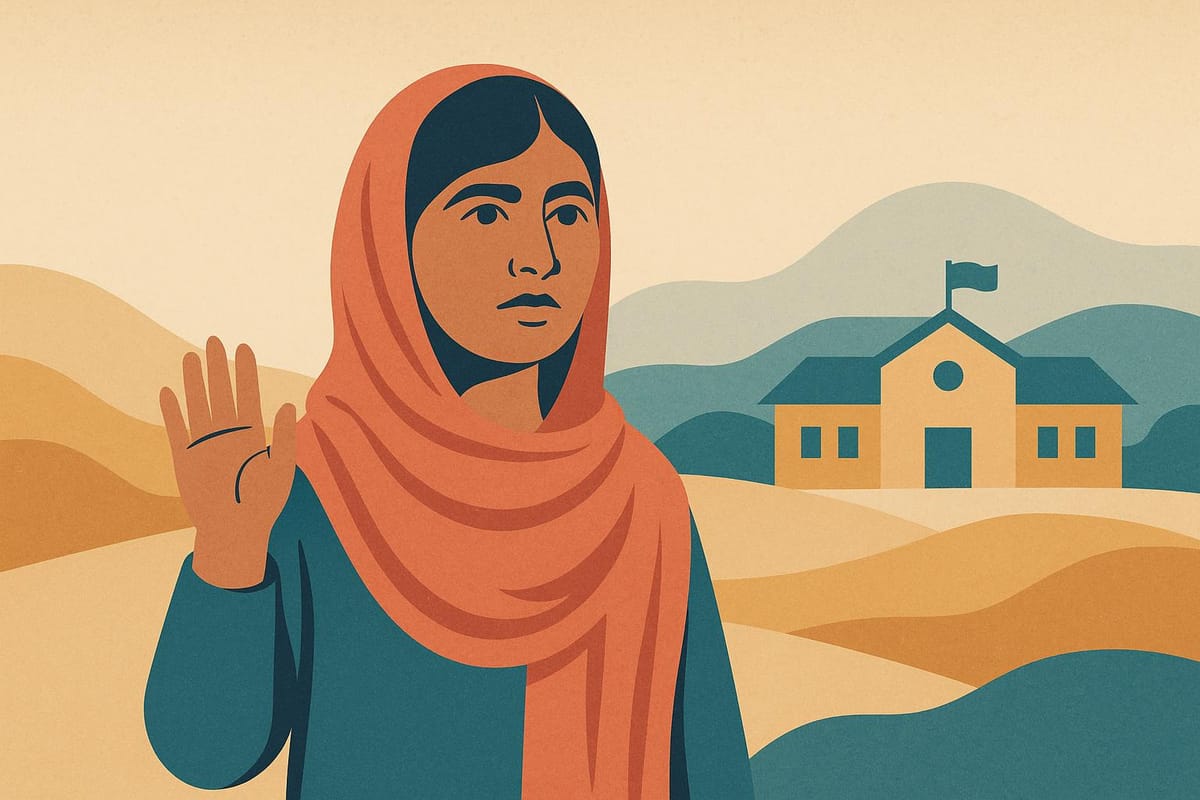Malala Yousafzai: Voice Against Violence
Explore the inspiring journey of a young advocate for education, highlighting resilience, storytelling, and the power of collective action.

Malala Yousafzai’s story is one of resilience, courage, and unwavering commitment to education. Starting as an 11-year-old blogger under Taliban rule, she became a global symbol for girls’ education and the youngest Nobel Peace Prize laureate at 17. Surviving a Taliban attack in 2012 only strengthened her resolve to fight for the 122 million girls out of school worldwide. Through the Malala Fund, she has channelled $47 million into education efforts across nine countries, empowering grassroots activists and amplifying unheard voices.
Her leadership style is rooted in three principles:
- Education: She champions education as a universal right.
- Equality: Her work addresses systemic barriers faced by girls, especially in conflict zones.
- Peaceful resistance: She advocates for change through dialogue and compassion, even towards her adversaries.
Malala’s approach to communication - anchored in storytelling, personal experience, and clear goals - has inspired global action. Her journey reminds leaders that true impact comes from standing firm in your values, empowering others, and turning challenges into opportunities for collective progress.
Empowering Talk: Resilience and Collective Action - Malala Yousafzai [2017] | Intelligence Squared

How Malala Communicates with Courage and Clarity
Malala's way of communicating shows how speaking with honesty and determination can turn personal struggles into a force for global change. Her ability to transform her own experiences into a platform for worldwide influence lays the groundwork for her impact on public speaking and youth leadership.
Malala's Vision and Values
Malala's strength in communication comes from her ability to address global challenges through the lens of her deeply held values. Her message is anchored in three clear principles: education, equality, and peaceful resistance.
Her delivery is strikingly straightforward. She doesn't dilute her words for the sake of diplomacy but speaks from the heart, shaped by her own experiences:
"I want education for all the sons and the daughters of all the extremists especially the Taliban... This is what my soul is telling me to be peaceful and love everyone."
This powerful statement exemplifies how she channels what could be anger into a constructive and hopeful vision. By linking her personal challenges to larger systemic problems, Malala illustrates how individual stories can serve as a bridge to broader societal transformation.
Public Speaking with Impact
Malala's speaking style blends careful preparation with genuine emotion. She uses techniques like 'chunking' - pausing to glance at her notes before directly addressing her audience - to ensure her message lands effectively.
One of her most compelling tools is anaphora, the repetition of phrases to build emotional intensity. For example, in one speech, she repeatedly begins sentences with "I am":
"I am Malala. But I am also Shazia. I am Kainat. I am Kainat Soomro. I am Amina",
This repetition creates a sense of shared identity and solidarity. Additionally, Malala often "begins with the end in mind", clearly stating her ultimate goal early on and then building her argument around it. This combination of authenticity and strategy highlights the power of clear communication in reshaping ideas about youth leadership.
Youth Leadership Redefined
Malala's communication style challenges traditional notions of leadership. At just 17, she proved that moral conviction and a clear message don't require years of experience or formal authority.
Her approach to leadership is thoughtful. Instead of directly confronting world leaders, she shifts the focus to others who deserve to be heard:
"Let's listen to these activists. They have been ignoring their voices, so hear from them and they will tell you what the issues are in this country for girls and women."
By amplifying the voices of others, Malala emphasises the importance of collective action over personal recognition. Her frequent use of inclusive language allows her message to cross cultural and generational divides, making it resonate with a wide range of audiences.
For leaders in the UK, Malala's example is a reminder that impactful communication doesn't rely on age or formal titles. Instead, it requires a clear purpose, a consistent message, and the courage to speak openly - even when it challenges established norms.
Using Stories to Drive Change
Malala Yousafzai's journey highlights how personal experiences can ignite global movements, inspiring action and driving systemic transformation. Her ability to turn her story into a call for change demonstrates the profound impact of storytelling.
Building a Narrative of Hope
Malala’s strength lies in transforming her personal struggles into a message that resonates universally. She uses her own experiences to spotlight the challenges faced by millions of girls around the world.
"I tell my story not because it is unique, but because it is the story of many girls." - Malala Yousafzai
This approach bridges the gap between her audience and the broader issues she advocates for. By sharing her vulnerability, she creates a sense of shared experience, shifting the focus from her individual journey to the systemic barriers that millions face.
Her memoir, I Am Malala, is a prime example. While it recounts the attack she survived, it weaves her personal story into a larger conversation about education, resilience, and the power of youth. This approach transforms complex policy issues into something deeply personal and relatable, inspiring readers to take action.
Malala also emphasises the need for collective action over individual recognition. She sees her story as a reflection of what could happen to any girl under similar circumstances:
"My story is not an exceptional story. It could have been the story of any girl if their fathers and brothers had allowed them to speak out." - Malala Yousafzai
By framing her narrative this way, she not only humanises global education challenges but also empowers others to see themselves as part of the solution.
Using Media and Platforms
Malala’s storytelling extends beyond words; she leverages media and technology to amplify her message and expand her reach. Her strategic use of platforms has turned her personal journey into a global rallying cry.
Her story mobilised millions, as seen in the petitions and campaigns that followed the attack. What began as an individual experience became a symbol for systemic change, sparking global conversations about education and gender equality.
Through the Malala Fund, she has scaled her impact further. Operating in over eight countries, the organisation supports local activists and projects tackling issues like poverty, war, child marriage, and gender discrimination. The Fund awards grants to grassroots organisations, with 20% led by girls or young women, enabling these individuals to become storytellers and advocates in their own right .
A partnership with Apple showcases how strategic collaborations can amplify impact. Apple supports the Malala Fund’s initiatives in countries such as Afghanistan, Nigeria, India, and Pakistan through the Malala Fund Education Activists programme. This programme aids more than 50 activists addressing local challenges. During the COVID-19 pandemic, activists in Nigeria adapted by researching the pandemic’s effects on girls’ education and using radio lessons to reach those without internet access.
The Fund’s storytelling approach is particularly effective because it focuses on elevating the voices of local activists rather than simply celebrating outcomes. Malala herself has said:
"My goal is to meet these girls, but also uplift their story so leaders listen to them rather than me." - Malala Yousafzai
This strategy ensures that change is driven by those directly affected, creating a ripple effect that extends far beyond Malala’s personal influence.
Malala’s belief in the power of stories is clear:
"I believe that storytelling is the soul of activism." - Malala Yousafzai
Leadership Lessons from Malala
Malala Yousafzai’s journey from a schoolgirl in Pakistan’s Swat Valley to a global advocate for education is a masterclass in leadership rooted in purpose and resilience. Her story shows us that true leadership isn’t about power or position - it’s about standing firm in your values, empowering others, and turning challenges into opportunities for growth.
Standing by Your Values
Malala’s unshakeable commitment to education, even in the face of life-threatening danger, is a powerful example of value-driven leadership. By the end of 2008, the Taliban had destroyed more than 400 schools in her region, yet she didn’t back down. Instead, in early 2009, she began anonymously blogging for the BBC, shedding light on the harsh reality faced by girls denied an education.
Even after surviving an assassination attempt, Malala refused to let fear dictate her actions. She turned the experience into a rallying cry for her mission:
"They thought that the bullets would silence us, but they failed. Out of the silence came thousands of voices. The terrorists thought they would change my aims and stop my ambitions. But nothing changed in my life except this: Weakness, fear, and hopelessness died; strength, fervor, and courage were born." - Malala Yousafzai
This underscores a vital leadership principle: authentic leaders stay true to their values, even in the toughest moments. Challenges don’t weaken their resolve; they sharpen it. As Molly Anderson from the University at Buffalo’s School of Management explains, leadership requires purpose, and Malala’s story is a testament to the power of standing for something bigger than yourself.
For leaders today, this means having the courage to take a stand, even when it’s unpopular or risky. It’s about maintaining integrity, using setbacks as opportunities to reinforce your principles, and building trust through unwavering commitment. This kind of value-driven leadership naturally fosters collaboration and inclusivity.
Listening and Working Together
Malala’s leadership isn’t about commanding attention - it’s about amplifying the voices of others. Through the Malala Fund’s Education Activists programme, she partners with local advocates in countries like Nigeria, India, and Pakistan, focusing on grassroots solutions instead of imposing top-down strategies.
This collaborative approach shone during the COVID-19 pandemic. In Nigeria, for example, activists identified that many girls lacked access to digital learning tools and were under increased pressure to marry. Instead of waiting for outside interventions, they took action, researching the pandemic’s effects on girls’ education and creating radio lessons to ensure learning continued.
Malala’s example shows that great leaders prioritise listening and empowering others. They ask the right questions, recognise the expertise of those closest to the problem, and create space for meaningful collaboration. The result? Solutions that are not only effective but also deeply rooted in the needs of the community.
Staying Strong During Difficult Times
Resilience is another cornerstone of Malala’s leadership. After the attack on her life, she didn’t retreat - she transformed her pain into a renewed sense of purpose:
"I told myself, Malala, you have already faced death. This is your second life. Do not be afraid if you are afraid; you cannot move forward." - Malala Yousafzai
Her resilience wasn’t about ignoring the pain but about using it to fuel her mission. At just 17, she became the youngest Nobel Peace Prize laureate, proving that age and experience aren’t barriers to making a global impact.
For leaders, this is a reminder that resilience often comes from having a mission that’s bigger than personal comfort. When challenges arise, focusing on the bigger picture can provide the strength to push forward. Malala’s words, “When the whole world is silent, even one voice becomes powerful,” highlight the transformative power of speaking up, even in the face of adversity.
Her story teaches us that tough moments can define a leader’s legacy. By turning difficulties into opportunities for growth, leaders can inspire change far beyond their immediate circumstances.
How to Apply Malala's Principles
Malala's leadership provides a powerful guide for leaders at any stage who aim to make a meaningful impact. Her approach, grounded in courage, honesty, and an unwavering dedication to her values, offers practical lessons to help you lead, communicate, and inspire with purpose.
Finding Your Voice as a Leader
One of the first steps in applying Malala's principles is identifying what you stand for and learning to express it with conviction. As Malala herself shares:
"At 11, I began speaking out - uncertain at first, I soon realised my voice reached far beyond my immediate circle".
Be bold about your values. When you publicly commit to something you believe in, you encourage others to see their own potential. Clearly stating your values isn’t just about making a statement - it’s about inspiring action and connection.
The key is to stay true to yourself. Instead of mimicking other leaders, let your personality shine through - whether that’s through humour, humility, or vulnerability. This kind of honest communication builds trust and makes your message more relatable.
Use storytelling as a tool. Stories are remembered far more than facts alone - up to 22 times more, according to research. Share personal experiences that highlight a challenge you faced and the change it inspired. What moments shaped your purpose? These stories don’t just connect you with your audience; they also motivate them to join your cause.
When crafting your story, focus on transformation. Talk about the obstacles you faced, the lessons learned, and the actions that followed. Sharing both struggles and successes makes your story more authentic and impactful, helping others see the real journey behind your leadership.
Building Trust Through Stories
Once you’ve found your voice, storytelling becomes a powerful way to build trust and engagement. Trust is the bedrock of effective leadership, and Malala’s ability to connect with audiences stems from her willingness to share her journey, including its fear, uncertainty, and growth.
Show vulnerability to strengthen trust. Malala’s openness about her fears doesn’t make her weaker - it makes her courage even more inspiring. She reflects:
"I told myself, Malala, you have already faced death. This is your second life. Do not be afraid if you are afraid; you cannot move forward".
This kind of honesty resonates deeply, showing that courage isn’t the absence of fear but the decision to move forward despite it.
Structure your stories thoughtfully. A good story has a clear beginning, a conflict, and a resolution. When you share your experiences, explain not just what happened but also why decisions were made and how challenges were overcome. This transparency fosters understanding and psychological safety, encouraging your team to be open and engaged.
Tie your stories to current goals or challenges. By connecting your narrative to your team’s mission, you invite them to see their role in the next chapter, turning storytelling into a tool for alignment and motivation.
Add specific details. Instead of vague statements like "we faced challenges", describe the exact obstacles, timelines, and outcomes. Specificity makes your story more vivid and actionable, helping your audience feel empowered and clear about the path forward.
Leading Change with Integrity
With an authentic voice and trusted story as your foundation, the next step is to lead with integrity. Malala’s approach to driving change is a masterclass in combining moral strength with practical action.
Stay focused on a core purpose. Malala’s commitment to girls’ education remains at the heart of her work, no matter the challenges she faces. She says:
"For me, the cause of equality for girls' education is something much bigger than me; and for that, somebody has to step up...If I stay silent, that means giving up on my cause and missing out on living a purposeful life, which is important to me. So, that is why I stick to my objectives and keep on fighting."
When leading change, identify a purpose that’s bigger than individual comfort or convenience. Use it as your guiding principle to navigate tough decisions and maintain momentum, even when progress feels slow.
Listen actively to drive effective change. Malala works closely with local advocates who understand their communities’ challenges better than anyone else. Similarly, as a leader, take time to listen before acting. Create spaces for genuine dialogue, ask thoughtful questions, and incorporate diverse perspectives into your strategy. When people feel heard, they’re more likely to support and contribute to the change.
Focus on solutions, not just problems. While acknowledging challenges is important, Malala’s leadership is rooted in imagining what’s possible. She urges:
"Instead of sending weapons, instead of sending tanks to Afghanistan and all these countries which are suffering from terrorism, send books...Instead of sending tanks, send pens. Instead of sending soldiers, send teachers".
As a leader, spend more time painting a picture of the future than dwelling on current issues. Help your team see the steps they can take to move towards that vision. This approach builds hope and energy, keeping the momentum alive.
Finally, leading with integrity means speaking up even when it’s uncomfortable. As Malala reminds us:
"When the whole world is silent, even one voice becomes powerful."
Conclusion: What Leaders Can Learn from Malala
Malala Yousafzai's remarkable journey - from an eleven-year-old blogger in Pakistan to becoming the youngest Nobel Peace Prize laureate - shows that leadership is deeply rooted in courage, conviction, and the ability to inspire others. Her story embodies the essence of values-driven leadership and authentic communication, reinforcing the core themes explored in this article.
Her life offers three impactful lessons for leaders:
• Authenticity builds connection: Malala’s strength lies in her willingness to share her genuine experiences, fears, and dreams. She reminds us:
"My story is not an exceptional story. It could have been the story of any girl if their fathers and brothers had allowed them to speak out".
This openness makes her message resonate universally, demonstrating that leadership can be both personal and accessible.
• Storytelling drives change: Malala’s narrative didn’t just recount events; it amplified the voices of millions of girls facing similar struggles. Through her story, a local issue transformed into a global movement, proving the power of storytelling to rally people around a cause.
• Unwavering values provide strength: Despite life-threatening challenges, Malala never wavered in her commitment to girls' education. Even after surviving an attack in 2012, she chose compassion over retaliation, famously stating:
"I don't want revenge on the Taliban, I want education for sons and daughters of the Taliban".
This moral clarity not only strengthened her resolve but also inspired countless others to stand with her.
Through the Malala Fund, established in 2013, she continues to champion education for girls worldwide, addressing the pressing issue of millions of girls being denied schooling.
Empowering Leaders to Make a Difference
These lessons offer a clear framework for impactful leadership. By embracing authenticity, leveraging storytelling, and staying true to core values, leaders can create environments where every voice is heard and valued. Whether leading a team, driving organisational change, or advocating for social causes, these principles remain deeply relevant.
Ziauddin Yousafzai, Malala’s father, captured this philosophy perfectly when he said:
"I did not clip her wings".
This simple yet profound statement highlights the importance of empowering others to find their voice and courage. Malala’s journey underscores what’s possible when someone decides to speak up for what they believe in.
As Malala herself eloquently puts it:
"I raise up my voice - not so I can shout, but so that those without a voice can be heard...we cannot succeed when half of us are held back".
Her story reminds us that true leadership is about lifting others, turning individual bravery into collective progress. For leaders facing challenges, Malala’s example offers both inspiration and practical guidance. The real question is: are you ready to use your voice to create change?
FAQs
How does Malala Yousafzai’s leadership stand out from traditional leadership styles?
Malala Yousafzai’s leadership is remarkable because it stems from inspiration, genuine conviction, and moral bravery, rather than relying on formal titles or positions of power. Her steadfast dedication to education and human rights has turned her into a worldwide emblem of resilience and transformation.
Instead of adhering to conventional leadership styles that often prioritise authority, rivalry, or personal achievement, Malala leads through her actions, drawing on her own story to motivate others. Her approach underscores the strength of empathy, honesty, and perseverance in driving real and lasting change.
How has the Malala Fund improved access to education in the countries where it operates?
The Malala Fund has played a transformative role in education, particularly in efforts to provide children - especially girls - with access to quality learning opportunities. In Afghanistan, the fund has facilitated free education for over 3.7 million children who were previously out of school and has supported specialised programmes tailored to Afghan girls. Meanwhile, in Nigeria, the fund’s advocacy has influenced the government to commit to increasing its budget for girls’ education by 2025.
These initiatives are part of a larger vision to ensure that every child, no matter their background or circumstances, has the chance to learn and succeed.
How does Malala Yousafzai use storytelling to champion girls' education?
Malala Yousafzai harnesses the art of storytelling to spotlight the barriers girls face in accessing education. Starting at just 11 years old, she wrote a blog detailing life under Taliban rule, offering a raw glimpse into her reality. Later, sharing her survival story after a harrowing attack, she touched hearts globally, forging a personal connection with her audience.
Through her vivid and heartfelt accounts, Malala not only raises awareness but also inspires action, championing the cause of education for girls around the globe. Her stories serve as powerful reminders of resilience and hope, motivating others to stand with her in the fight for equality and opportunity.



